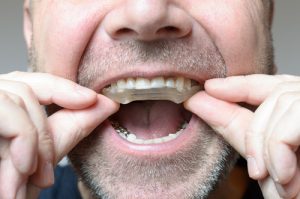 Does your jaw ever feel sore when you wake up in the morning? If so, you could have bruxism. People with bruxism frequently grind or clench their teeth together. Since this can significantly damage the teeth, here are some tips to help you stop grinding your teeth. If bruxism has already led to notable tooth damage, dental bonding or porcelain veneers can restore your smile.
Does your jaw ever feel sore when you wake up in the morning? If so, you could have bruxism. People with bruxism frequently grind or clench their teeth together. Since this can significantly damage the teeth, here are some tips to help you stop grinding your teeth. If bruxism has already led to notable tooth damage, dental bonding or porcelain veneers can restore your smile.
Why Grinding Teeth Is So Bad
Your jaw and mouth muscles help you chew and speak, so it isn’t surprising that they are some of the strongest muscles in your body. Factors such as stress, anxiety, or anger can cause you to clench your jaw from time to time, which means that these incredibly strong muscles are putting excessive force on your teeth. On occasion, this doesn’t cause serious damage, but for people with bruxism, the regular clenching or grinding of teeth can affect not only your dental health but also your overall well-being. Consistent wear can lead to cracks, chips, tooth loss, headaches, earaches, receding gums, inflammation in the jaw, and lockjaw.
Tips to Help You Quit
1. Get a Mouth Guard
Grinding teeth is particularly common at night. Since you can’t control your movements while you’re sleeping, a mouth guard can protect your teeth at night. While this will not prevent teeth grinding, the mouth guard will take the brunt of the force so that your teeth do not have to. A mouth guard can be purchased at a local drug store, but it is better to have one custom made to fit your mouth. Dr. Sands can devise a custom mouth guard for bruxism if you need it.
2. Reduce Stress
Bruxism is often triggered by stress or anxiety. Find ways to reduce stress in your life so that your muscles are less likely to take it out on your teeth. Many people find that practices such as meditation, yoga, or even taking a hot bath can alleviate stress and provide relaxation.
3. Don’t Overwork Your Jaw
Overworking the jaw can increase tension in it, leading to jaw clenching or teeth grinding. Avoid foods that are difficult to chew, such as tough meat or chewy candy, as well as chewing gum.
4. Avoid Alcohol and Caffeine
Alcohol can increase the urge to clench your teeth, while caffeine can increase tension and jittery movements such as tooth grinding. Both alcohol and caffeine can increase symptoms of bruxism and should be avoided, especially in the afternoon and evening hours.
5. Get Treatment for Sleep Apnea
Though the two are not guaranteed to coincide, many people with bruxism also have sleep apnea. Getting treatment for sleep apnea (such as with a CPAP machine or mouth guard) can also be effective for preventing teeth grinding.
6. Relax and Massage Your Jaw
Jaw exercises and muscle relaxants can help relax the jaw. Gently massage the jaw, neck, and face to relieve tension, and consider asking a chiropractor or physical therapist for help with some jaw exercises. It can even help to apply a hot, wet washcloth to the sides of your jaw for several minutes at night before bed to relax the muscles.
Dental Treatments for Damaged Teeth
If any tooth damage has occurred due to bruxism, Dr. Sands can use dental bonding or porcelain veneers to restore your teeth. Dental bonding uses a cosmetic resin that is bonded to the tooth, sculpted and molded, then hardened until it matches your enamel. Porcelain veneers are thin sheets of porcelain that are cemented to your teeth to improve their form, appearance, and function. Both treatments can improve the appearance and function of teeth that have been worn down by teeth grinding.
Dr. Kevin Sands can offer additional recommendations for bruxism treatment and prevention of teeth grinding during your personal consultation. To schedule your appointment, please call 310.273.0111 or complete our online contact form today.